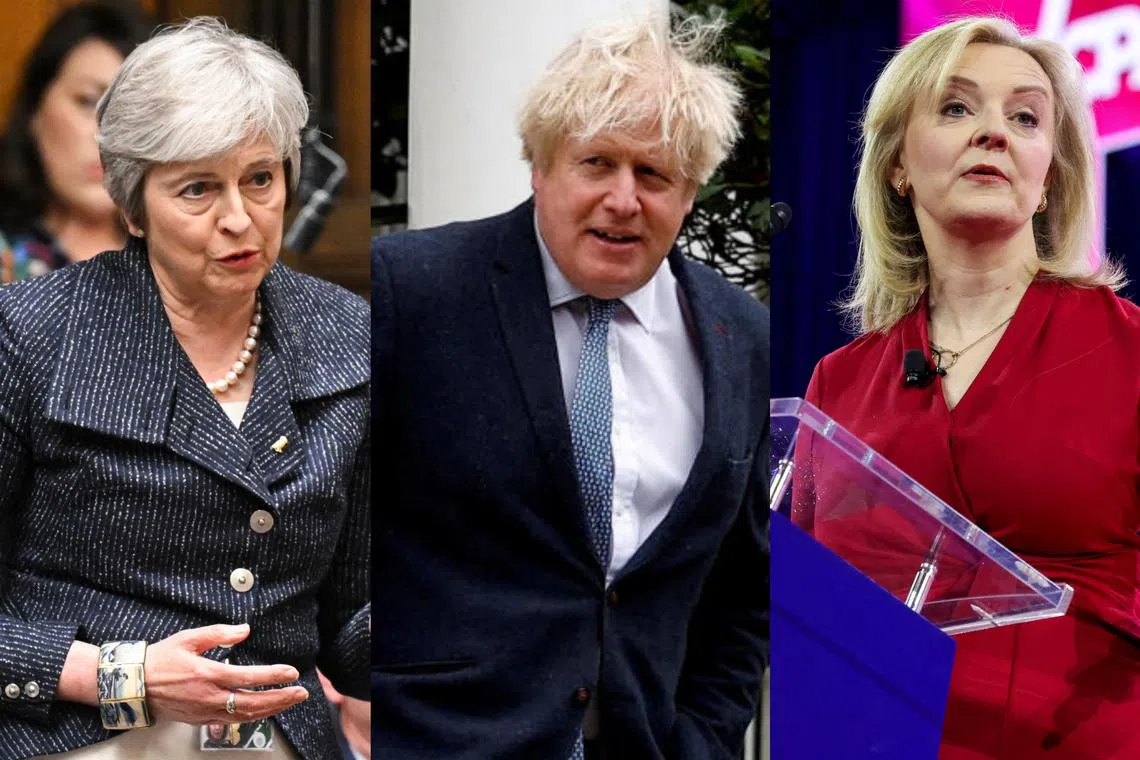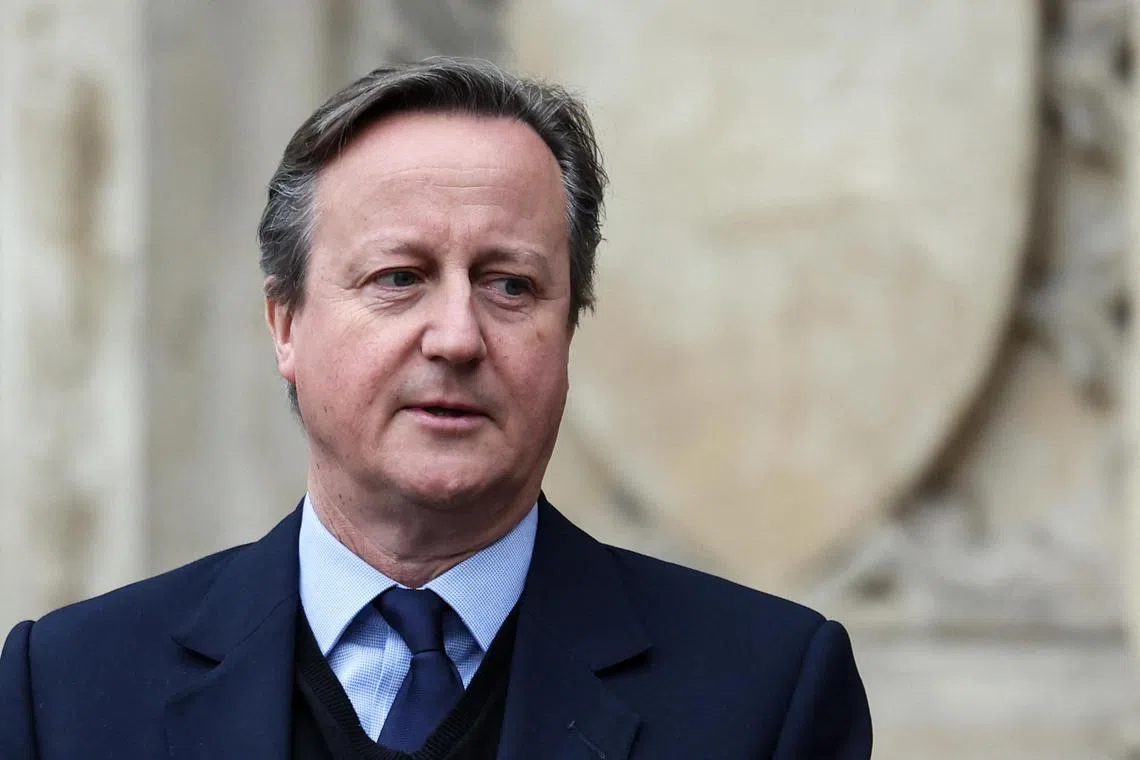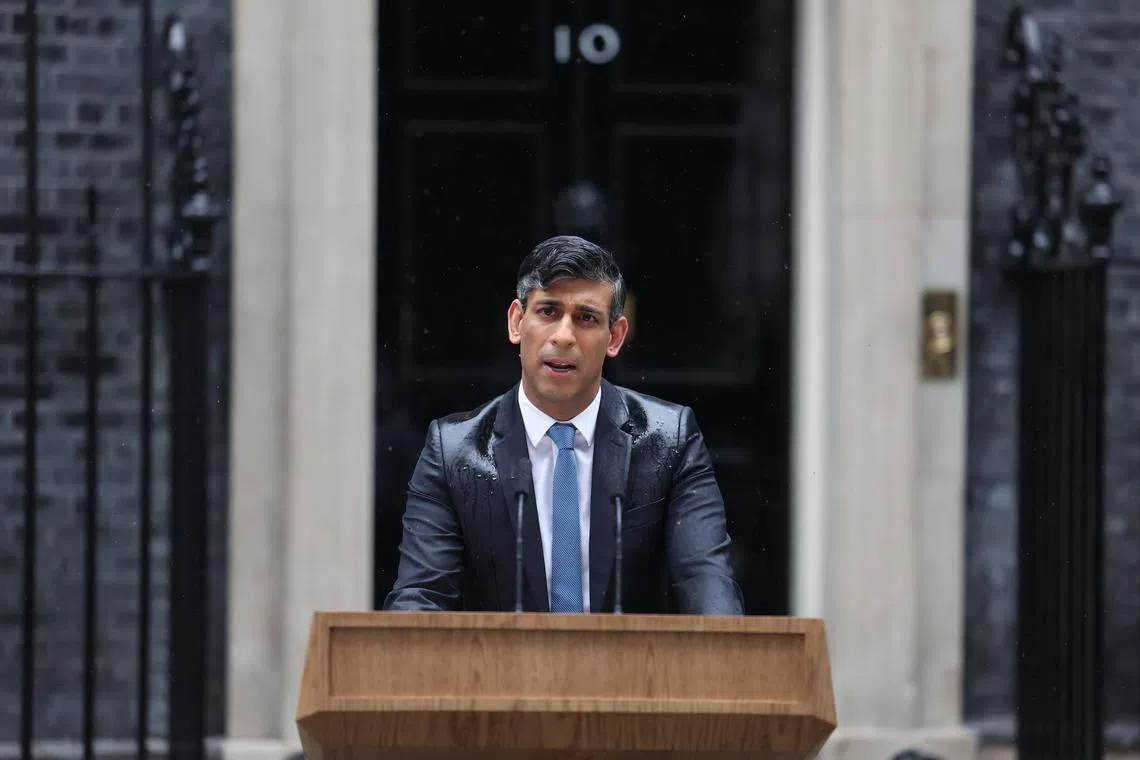Key political moments from 14 years of Conservative rule in UK
Sign up now: Get ST's newsletters delivered to your inbox

Former British prime ministers (from left) Theresa May, Boris Johnson and Liz Truss.
PHOTOS: AFP, REUTERS
Follow topic:
LONDON - Britain will hold a national election on July 4
Below are the defining moments of the Conservatives' four terms in power - under five different prime ministers - since 2010:
2010 election results in hung Parliament
The Conservative Party led by David Cameron win the most seats in parliament but not an overall majority, ousting the Labour Party which had been in power since 1997.
Britain has its first coalition government since 1945, after Mr Cameron agrees to work with the centrist Liberal Democrats.
2014 Scottish referendum
In a hard-fought referendum that had threatened to split the United Kingdom, Scotland votes 55 per cent to 45 per cent against independence in a victory for Mr Cameron and the main national political parties over the Scottish National Party.
2015 surprise Conservative election victory
With polls pointing to a close election, Mr Cameron wins an unexpected majority and a second term as prime minister.
He follows through on a 2013 pledge to hold a referendum on leaving the European Union. Mr Cameron wants Britain to remain in the EU.
2016: UK votes for Brexit, Cameron quits
Britons cause a global shock by voting 52 per cent to 48 per cent to leave the EU, ending a more than 40-year union and plunging the country into its biggest political crisis since World War II.
Mr Cameron resigns and the party chooses Mrs Theresa May to succeed him.

Mr David Cameron resigned as PM in 2016, after Britons voted to leave the EU. He is currently Britain’s Foreign Secretary.
PHOTO: AFP
2017 snap election gamble backfires
Riding high in opinion polls and seeking a bigger majority in parliament to push Brexit legislation through, Mrs May calls a snap election. The gamble backfires as the Conservatives lose their majority.
They form a government by striking a deal with Northern Ireland's pro-UK Democratic Unionist Party.
May 2019: Brexit paralysis, May resigns, Johnson takes over
Mrs May quits after failing to break a parliamentary deadlock over how Britain should leave the EU. Mr Boris Johnson - one of the main faces of the pro-Brexit campaign - wins the internal Conservative Party contest to succeed her.
Dec 2019: Johnson leads Conservatives to sweeping win
With parliament paralysed over Brexit, Mr Johnson calls a snap election. Campaigning under the slogan "Get Brexit Done" he steers the Conservatives to their biggest election win since Margaret Thatcher's landslide victory in 1987.
2020: Brexit gets done
Mr Johnson uses his mandate to drive a Brexit deal through parliament and Brussels, and Britain exits the EU on Jan 31, 2020, becoming the first state to withdraw from the bloc.
Much of the impact of the deal is delayed until after a transition period. Nevertheless, it represents Britain's biggest geopolitical shift since the loss of its vast empire.
July 2022: Johnson ousted
Mr Johnson leads Britain during the Covid-19 pandemic - at one point being hospitalised himself by the disease - but a long list of scandals and missteps eventually prove too much. He steps down after a ministerial revolt.
Sept 2022: Truss’ chaotic premiership
Ms Liz Truss beats Mr Sunak in a contest to succeed Johnson. Her "mini-budget" containing unfunded tax cuts spooks financial markets, pushing up borrowing costs sharply and further tarnishing Britain's reputation for political and fiscal stability.
She lasts only 44 days before announcing her resignation.

British Prime Minister Rishi Sunak announcing a general election will be held on July 4.
PHOTO: EPA-EFE
Oct 2022: Sunak becomes prime minister
Mr Sunak takes over as Britain's third prime minister in as many months, pledging to restore stability to government. He makes five key pledges focused on the economy, stopping illegal migration and improving the health system.
In February 2023, Mr Sunak strikes a deal with the EU on trade rules for Northern Ireland, improving ties with the bloc.
May 2024: Sunak calls general election
Trailing the Labour Party by around 20 points in the polls, Mr Sunak calls an election for July 4. REUTERS

